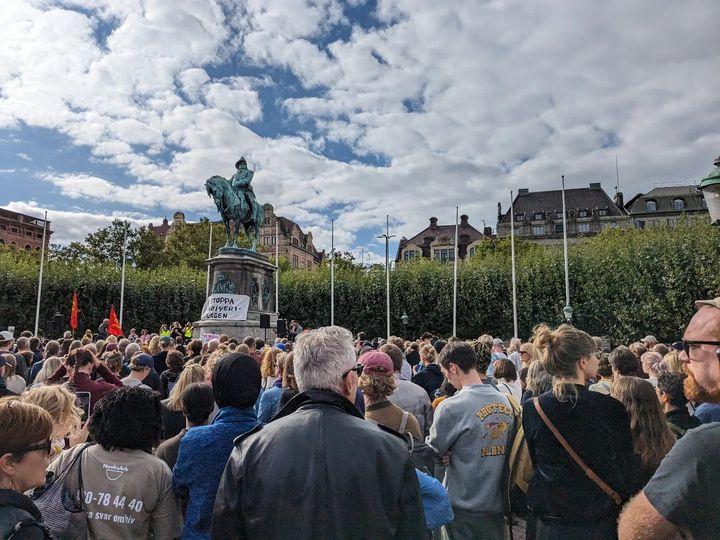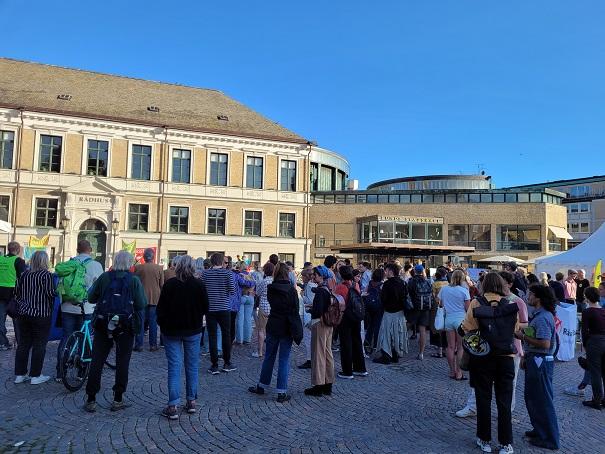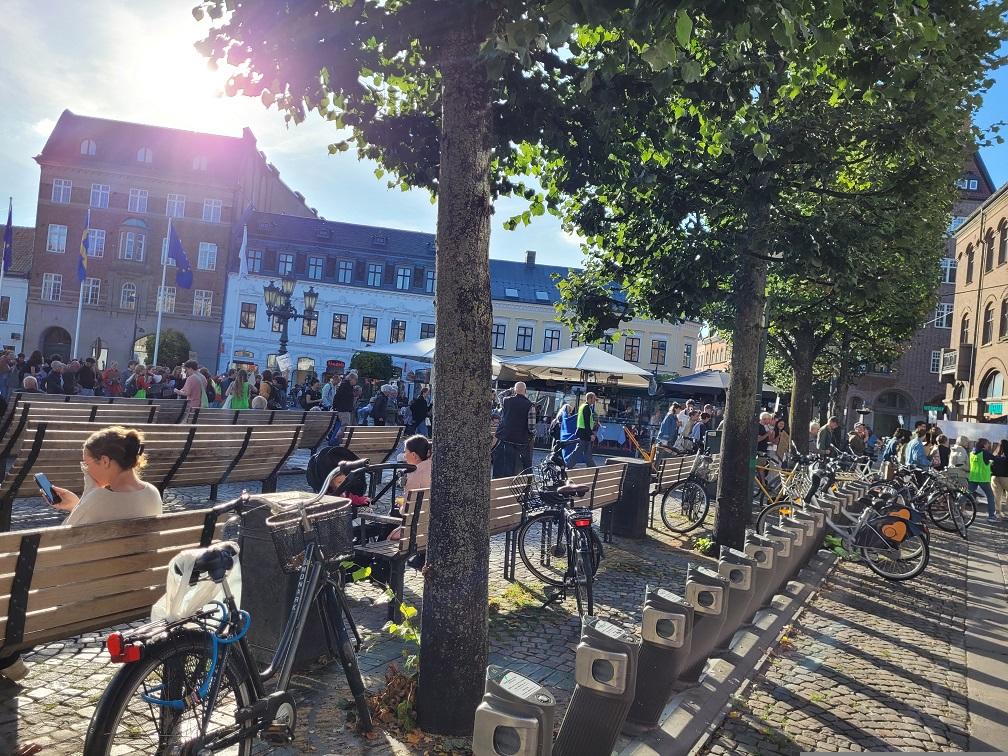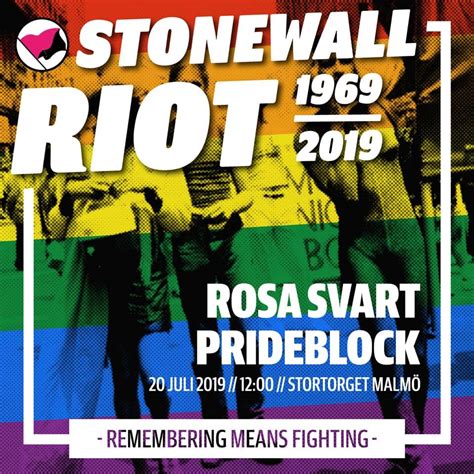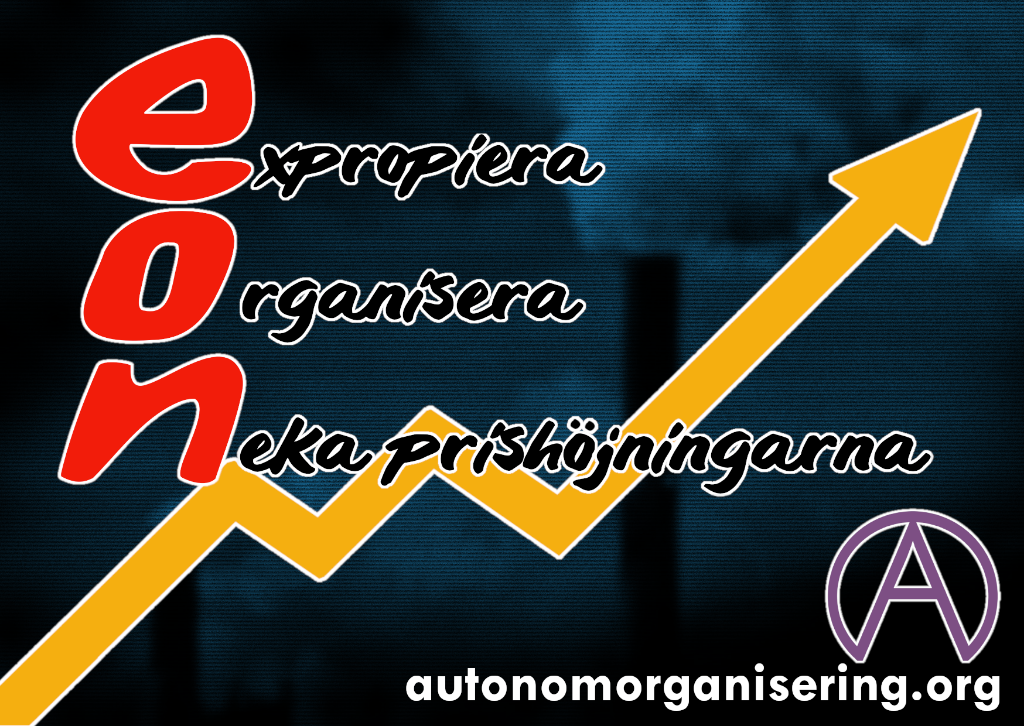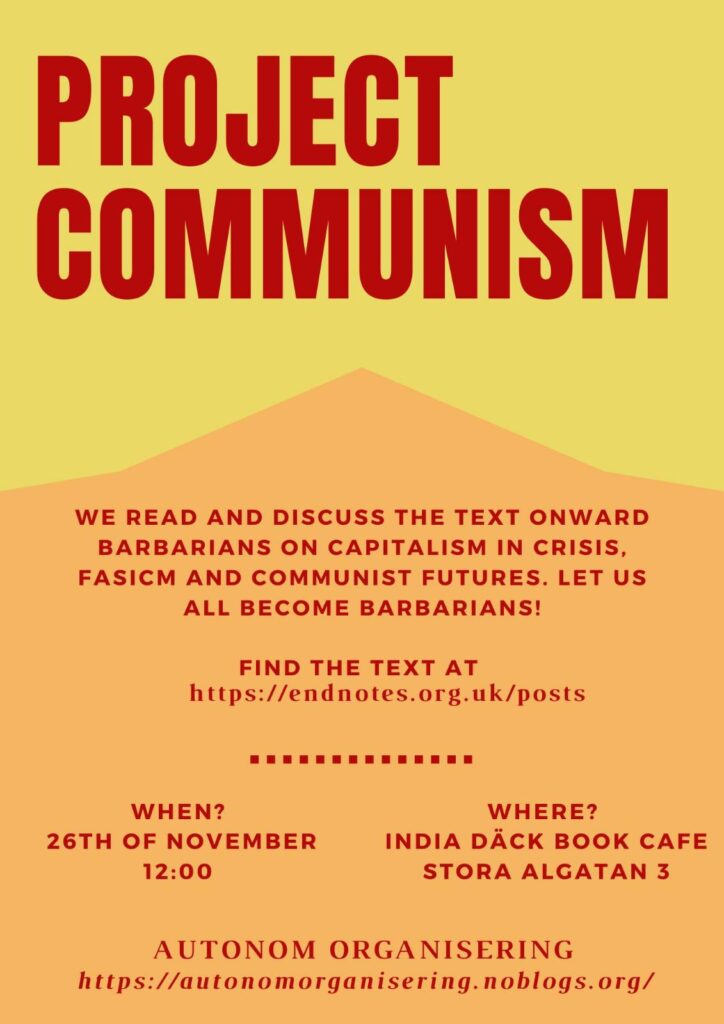Introduction
We have recently encountered a tendency in our common spaces, in our activities and among comrades. We have chosen to embed this tendency in the controversial concept of identity politics. We believe that there is a common foundation in these politically problematic behaviors and positions stemming from the fetishization of identity, an argument we hope to make clear through this text.
There are many examples of this, the closest at the time of writing being the highly infected conflict at Småland’s Nation in Lund. Without going into this in detail, as it would require too much space, identity-political arguments are used excessively in the debates taking place there. For example, a group of identity-politically oriented persons believe that their perception of political issues such as the issue of prostitution must be accepted as their positionality as trans- and racialized allows them interpretative preference, a privileged position of knowledge, and not to agree with them is by definition transphobic and racist.
There already exist a plethora of critics of what is broadly called identity politics, most of them being reactionary. In addition to the criticism from various liberals or conservatives, there is also a criticism from a reactionary “left”. In the worst cases, as in the case of the Örebropartiet and the splits in the Communist Party, these have degenerated into completely leaving the left and becoming part of the growing wave of right-wing populism. Common to these groups is a desperate search for the perfect class-subject, the primordial worker. These loud critics of so-called identity politics are themselves some of the biggest culprits in perpetrating identity-based politics, as their critique and politics is fundamentally just to propagate a (distorted image of one) single subject position, what they call the “working class” but which is only part of the total working class, one that can rather be understood as a distortion of the white male working class.
What we seek to present here is, in contrast, a critique through feminism, a radical critique with the ambition to take us deeper in the struggle. Our critique is not against postcolonial or feminist theory, as is the case for the aforementioned reactionary critics of identity politics. We do not want to stop at the fixation with positions of these perspectives, but constantly develop these, their inherent contradictions and thus break free from them. We seek a radicalization of the positions that a feminist, queer, Marxist and postcolonial analysis enable.
In order to disperse ambiguities, and for the sake of clarity, we would like to point out that we are not interested in individuals or their individual behaviors, but rather how the movements we are active in behaves. What we want to do is to raise a structural criticism of what may at a glance seem radical or left, but when misinterpreted and manipulated tends to collapse into essentialism and become reactionary. To do this, we have had to write an advanced text where we go through the historical basis for identity politics, especially in relation to questions about what is sometimes called “positionality”, a concept which is broadly and carelessly used by identity politicians. To make this text a bit more accessible, we have included a glossary at the end of the text as well as a list of relevant literature. The readers are also more than welcome to invite us to present this text. This text differs slightly from the Swedish version which links more frequently to other texts of ours that are in Swedish and which we left out in this post due to the language factor.

Frequently, discussion on this topic become incredibly caustic. We therefore believe that it is important to take a step back and think about what we actually say and mean. We can already hear the response and criticism that may meet this text; that it is written by white men and therefore is incorrect, illegitimate and potentially racist. We want to put the question directly to you, the reader: Does it make any difference if this text is written by a group of white cis-men or a group of racialized queers? Does the content, its meaning, points or relevance change? It is an open and honest question that we encourage the reader to carry with them throughout the text and which we ourselves try to present our view of in the conclusion.
Standpoint theory
A fundamental part of our political understanding and analysis is standpoint theory, an analytical tool that unfortunately is also incorrectly used by the people against whom this text is directed. Standpoint theory originally comes from Marx and was developed by the Hungarian communist Lukács. A central concept for Lukács is specifically the standpoint of the proletariat. In short, Lukács argues that the position of the working class in relation to production, history and other classes gives it a unique perspective from which society can be viewed and understood. It is only through this position – the perspective of the working class – that society can be truly understood. It is a so-called privileged epistemic position, with potential for knowledge that is not available to bourgeois theorists or the bourgeois class as a whole.
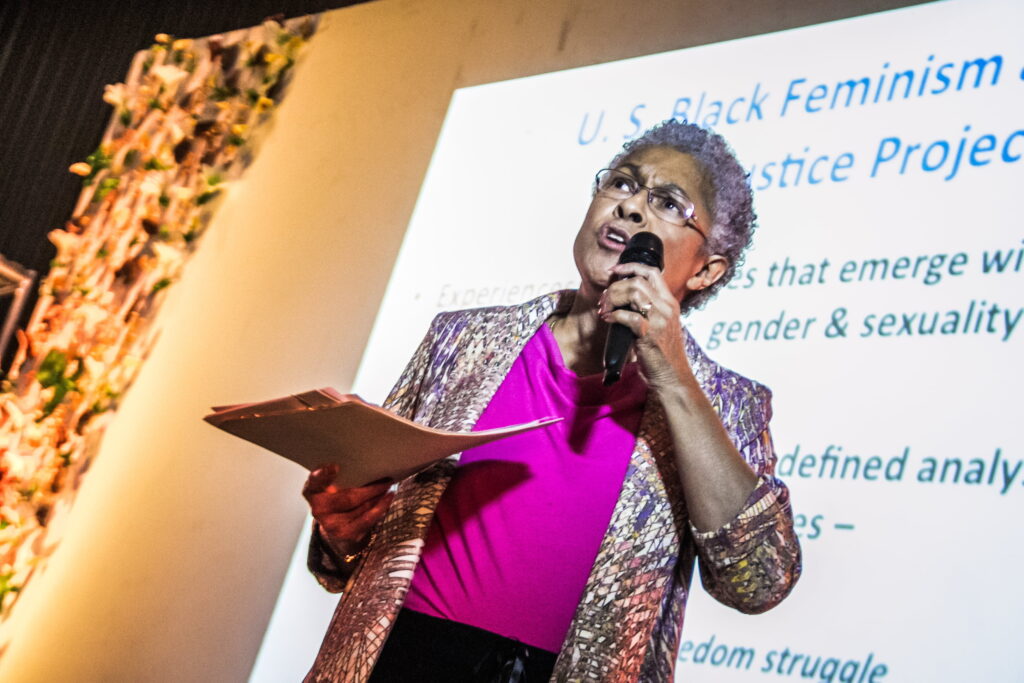
This foundation has since been developed through a feminist critique of objectivity standards in science by thinkers such as Donna Haraway, Sandra Harding and Patricia Hill Collins. These pointed to how science, objectivity and rationality were used as a means of power to dominate and exploit, as well as to legitimize these same practices. This was an intervention with an emphasis on epistemology, i.e., how we gain knowledge. It was a response and reaction to the separation between reality and knowledge in philosophy, a dualistic thought that is the basis of modern science and which also separates both being and knowing from politics and ethics; a result of science as designed by men, bourgeois men specifically.
At its fundamental level, this critique was constructed on the same master-slave dialectic which Hegel, and later Marx, used to point to the unique position of knowing available to the non-dominant. The argument is that the suppressed perspective, in this case women’s’, as a result of their position offers a more complete picture and understanding of reality in contrast to the dominant, in this case the male, perspective. From this basis in feminist critique of the male perspective, standpoint theory has been expanded to include other so-called subaltern perspectives, with the common and constant condition that all perspectives are incomplete.
This embrace of incompleteness runs contrary to the search for the fetishization projects, which can be seen in the left’s politics of purity and the longing for the perfect oppressed subject. This can be seen expressed in the search for the “real worker”, as in the case of reductionist Marxists, or the racialized woman from the Global South, where identity politicians are concerned.
As a result of this understanding of knowledge, standpoint theory seeks a type of knowledge that does not transform subjects into objects and thus divides knowledge between subjects and objects, but rather a way which preserves the agency of the studied subject; a science grounded in lived reality. Feminist thinkers sought a reflexive science, a science capable of understanding itself, which “sees the seer”, a science which understands what formed the perspective in order to better “know the knowing”. This was an attempt to see how systems of knowledge themselves had a certain gendered character. Feminists like Haraway could successfully demonstrate that when common science was held up against a feminist analysis, one could clearly see how science is shaped socially. From this perspective, knowledge is understood as an activity, emphasizing how the knowledge that we create, we create in relation. i.e., socially with others.
What distinguishes, and shields, standpoint theory from collapsing into postmodern relativism is, firstly, its dedication to an explicitly political and emancipatory political project. Secondly, unlike the postmodern perspective, standpoint theory advocates partial, localizable and embodied knowledge that can also exceed its own restrictions.
Because how do we handle a situation where two subjects from the same position disagree with each other? Or when purely reactionary politics is expressed by certain subjects, something which is done every day and all the time? When we talk about experience and position, we do not mean that we have direct access to the truth as an automatic consequence of our positionality. It is absurd that this is ignored, as if all racialized people agree with each other and do not have their own politics. For identity politicians, it becomes impossible to coherently explain dissident thinking within a group, as this undermines their legitimacy as representatives. A common response is setting and enforcing stronger boundaries; through more esoteric and obscure explanations, these people try to demonstrate how dissidents in some way or other do not actually belong to the identity group in question.

If we seek a truer understanding of reality, it is thus always of interest that we expand our understanding by seeing more perspectives as well as understanding how they interact with each other. As the post-colonial philosopher Gayatri Spivak explains: If we give up the struggle for knowledge by thinking that we have direct access to truth through our subjectivity, we naturalize power relations. Thus, positionality itself is not enough. The tools to make the subordinate perspective available are the ideological, critical and political practices they develop in relation to.
Rather, to search for and creation of knowledge is something which has a political dimension, an act. This also links theory to practice, something which is fundamental to us. These two, theory and practice, constantly act upon each other in a dialectical relationship. Standpoint theory is thus an important theory. But, as we will see, in the transition from a structural critique to an individual one, it becomes a moralistic, individualistic criticism and consequently loses its political, radical potential.
Identity
The basis of identity politics is, of course, identity, i.e., belonging to a particular group or category. The politics carried out in the names of these identities is usually based on real and deep structural oppression. For us, the difference lies in how we understand these oppressions – such as race, class, sexuality, gender. We argue that the proponents of identity politics do not understand identity categories as historically specific to a certain historical context, but instead as transcendent, outside time, applicable as categories in and of themselves.
This approach reduces people to observable social attributes and practices which are defined as if their existence was inherent and actual rather than the result of power. What is the end point of this way of understanding identity? Well, in absurdum, this delimiting and essentializing logic ends in racial biology; guarding the boundaries of identities and their expressions, assigning characteristics and rights based on predetermined innate properties. We’ve seen this, for example, in the case of the “dreads discussion” in the Copenhagen movement where white people who have dreadlocks are prohibited from entering the legalized squat Bumzen, as this is seen as “cultural appropriation”, and where a young person who can be perceived as white, but who has a racialized parent, was encouraged to prove his genetic heritage in order to enter.
We believe that identity politics deals with social categories, which is what identities really are, as static units. This only serves to further cement, reproduce and strengthen these categories. This makes identities and their equality with other “privileged” groups both the start and end point for political activity, rather than striving to free ourselves from identities as such.
In contrast we view these social positions as things we do or that others make us out as, not things we are. We argue that identities are reified social categories from which we should break free, not within which we should be kept. By this we mean that the static view of identity politics on social categories is the same as the process by which social actions, creations, characteristics and structures are perceived and treated as things and, vice versa; that dead things are understood and treated as if they were independent of human activity and agency. In the commodity form, this is expressed in, for example, alienation and commodity fetishism, where the social relations of production are made invisible. As the commodity form is the dominant form by which interpersonal relationships are regulated under capitalism, social relationships are also structured according to this form. In the case of identity politics, the effect is that the identity categories are allowed to appear as something existing above or outside of human relations, such that we humans must obey them. In this way we become objects, only following laws of nature. Here, we argue that the true relationship is of course the opposite; that is, identities are social, plastic and that we do not need to accept ourselves in any predetermined structures. We believe that this approach lets us see behind and beyond the structures forming identity, and consequently dismantle and go beyond them.
As the focus of identity politics is difference and its formulation, the divisions are potentially endless. This necessarily extends to differences not only between groups, but also between individuals. One’s ability to present and signal predetermined, specific attributes is a requirement in identity politics; identity politics requires identification. The practical result of identity politics is an never-ending formulation of differences, which we believe leads to fragmentation and the stagnation of political activity. This also gives rise to what we argue is the intellectual impotence which is so prevailing within identity politics. As soon as critique is leveled against identity politics, this is answered with the argument that the critic’s identity is what produces and motivates the critique, as if identity in itself explains the content of the argument and what causes it. Once this ‘fact’ is established, i.e., that the sender’s identity and nothing else is the actual causal factor for a statement, all content loses its significance.
In this kind of circular defense, everything, and we mean everything, is dependent on and understandable only if read through speaker’s – by other’s perceived and ascribed – identity. In this way, every opportunity for critical thinking is shut down. It deprives people outside a specific identity group the legitimacy to comment at all on things that affect that identity, no matter how absurd or reactionary a statement might be. Not only that, even those who consider themselves and are considered to belong to the said group can be denied the legitimacy of their views if they do not follow the established – within the group hegemonic – line, such as in Småland’s nation where identity politicians treated transgender and racialized people’s opposition to their line with the argument that they are “assimilated.” This creates a social climate where you paint in black and white; where anyone who does not fully agree with the identity politicians become pariah; i.e., where there is no room for intellectual debate and understanding, where perspectives cannot be aired and evaluated critically, but where your only choice is to loyally join the ranks or to be excluded. This does not break power structures; it only creates new ones. This, then, can also help explain the motivation as to why even so-called radicals propagate this type of politics: to increase their own power in certain social space.
Recuperation and representation
As a result of the previously described view of identity are we can identify two tendencies in political life and practice, recuperation and representation. These exist both as potential and logical continuations of this understanding and practicing of identity, but also as actual existing practices.
By recuperation, we mean the neutralizing act that seeks to keep the radical appearance of a message or a movement, but which erodes and empties the actual content of the same. This is something we can see historically, for example, in the liberal LGBTQ-movement, particularly among gay cis-men, who have long enjoyed a hegemonic position in that movement. By appealing to the idea of “equal rights”, one formulates the highest desire and ultimate goal of one’s politics as that of achieving the same level or status as that of society as a whole. The ultimate aim for these movements is to achieve normality, to be incorporated and accepted on the same terms as white, middle strata cis-men. What this does is to allow the subversive to be disarmed, allowing the dangerous to become tame, and by extension be subsumed into and even strengthen the prevailing order. To voluntarily be incorporated into and even propagate for and strengthen identities as they are sanctioned from the above -by the state, by capital, by patriarchy – is to allow oneself to be predetermined, easily categorized and thus pacified.
To clarify what we mean, we want to point to queerness as an example of anti-identity; that is, going beyond and through, breaking up fixed identities and exist in a state of constant motion. Queerness is, as we understand it, not an identity; it is a praxis, a way to move in and relate to the world. This keeps the revolutionary potential that exists in queerness alive, as one does not allow oneself to become yet another pacified identity, but instead remain an indeterminable subject, whose constant transgression poses a threat to the disciplinary, categorizing and normative order.
The second tendency is the politics of representation, i.e., the idea that individuals can represent groups, in this case specific identity groups. One of the problems with identity politics is that activists and “leaders” too often become the “authentic voice” for their groups, in the form of “I speak for all X”, a practice that recreates power relations. Instead of breaking down the prevailing logics, you only participate in your own submission by accepting – and even chasing – representation within the prevailing system as your only remission.
Our ambition is to listen to, examine or put ourselves in discussion with people from different social positions, this is a cornerstone in understanding the world – as we describe in the above section on standpoint theory. What we reject is the elevation of individuals to representatives, as this is the logic of reformism and parliamentarism. If we talk about “communities” in this way, we treat them as if they could be represented, i.e., that an individual could manifest the will of a heterogeneous collection of people.
Not only that, the representative, this individual, is no longer understood as an agent with their own politics, history, class and gender, but as a genuine and direct channel to a collective will. The same absurd thing happens when we become happy as soon as “someone” from another position engages with us; we make them out to be representatives of a group and think that they all think the same. Of course, the composition of a political group is relevant. This is not what we turn against, but rather the tendency to essentialize individuals as representatives of a social group. This is essentialism and always a dead end.
The politics of Ressentiment

We argue that ressentiment is a useful analytical tool to help us understand where much of identity politics originates and what drives it. The term has its origins in the writings of Nietzsche and we have been inspired by Wendy Brown’s insightful reading and use of Nietzsche in relation to identity politics. For clarity, ressentiment is not the same as the more common “resentment”, which describes a feeling. In short, Nietzsche and Brown hold that the power relations which prevail in society can create a specific type of reaction in the subordinate subject, i.e. in groups and individuals with less power. Impotence is a basic and driving force behind ressentiment, that is, the inability or the experience of inability to influence or effect; in essence, the lack of power. This is something that is particularly present and prevailing in the modern capitalist subject, where individuals are affected and controlled by enormous forces beyond their control, such as patriarchy, imperialism and environmental degradation. At the same time, the modern subject is incredibly individualized, naked and deprived of social ties and contexts. This is a distinctive feature of our time: the complete and utter responsibility of the individual for herself, her health and her happiness, combined with the most powerless of positions.
The combination of these factors acts as a potent breeding ground for ressentiment. Here, identity enters as both product and reaction to this condition. The point here is that identity does not consist of an active component, but is a reaction to something. Ressentiment’s “creative deed”, the only way for this structurally impotent subject to relieve its pain, is to rework this pain into a negative form of action in the form of revenge. In this form, revenge is a negative substitute for actual action and is achieved by imposing suffering on others.
Thus, the subordinate must constantly confirm what defines her, i.e., her pain. When this driving force is turned outwards, in a political context, it takes the form of reveling in political impotence instead of seeking self-affirming liberation through active action and the construction of positive visions of the future. When you are driven by a historical injury, you have to tear at the wound time and again in order to (re)create yourself as a subject. Revenge as a reaction produces identity that is both bound to the history which produced it and as a reproach to that which now embodies that history. That is, through such a practice, a revenge practice that in itself is based on the repetition of the injustice of subordination, your political practice is bound to constantly repeat and thus amplify the pain, the wound that this injustice entails. Unfortunately, this is far too common in feminist and anti-racist spaces, and is cultivated as a supra-political identity overlaying all other questions.
Identity policy is permeated by the establishment of identities as reified things, policing and demarcation in order to protect one’s identity; to define us-and-them both outwardly towards evil others, but also a politics of purity inwards against one’s own group. We find this to be frighteningly similar to the regulatory, disciplinary society in its formation of disciplinary subjects. We believe that this is both a product, but also potentially a recreation and repetition, of the disciplinary society that continuously divides, classifies and specializes. This political conduct thus becomes a mirror image of our modern society that operates through monitoring, registration, assessment and delimitation.
In addition to this disciplinary tendency, identity politics is permeated by another power dynamic, namely moralism. The instrumentalized victim role – i.e., expressed as it is formulated within the framework of this way of thinking, not the actual structural oppression that is so pervasive in our society – allows a morally elevated position, i.e. power, within the framework of this politics, if only in certain social spheres. What shines through here is the pervading individualism and total lack of an analysis of power that runs through this politics. These proponents refuse to see how this type of logic and rhetoric gives power; how they turn the structures of power upside down, not to break the prevailing order but only to put themselves on the throne. In the end, this all becomes a very useful way for this paradigm to hide its basic contradictory and impossible premises, as well as a favorable environment for those who seek to raise their own social position.
Moving Forward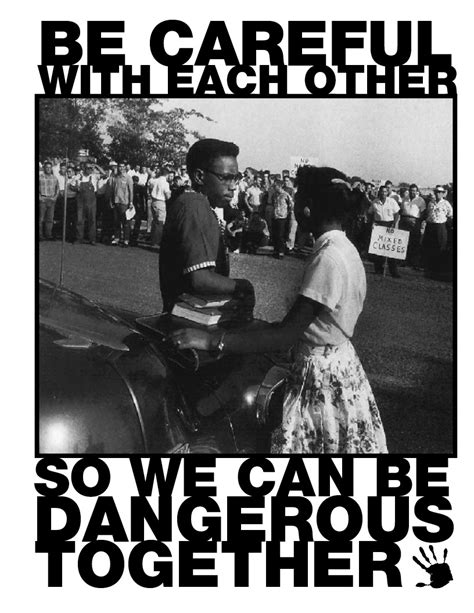
At the outset of this text, we asked the reader “if it makes any difference whether the text was written by a group of white cis-men, by queers or people of color? Does this change the content, meaning, points or relevancy?”.
It has been an important decision for us that when we express ourselves as Autonom Organisering, we do it from a perspective that seeks to overcome the individual and different positions in which we live. This is not something that happens automatically with the flick of some magic wand. We are not part of the tendency that says we can simply think away our social backgrounds and unite in our belonging to a class or movement, but we are also not stuck in identity politics’ fetishization of identity. We believe that collective processes, with more perspectives, takes us closer to the truth and thus allows and awards us better understanding and more useful political tools.
Our politics is concerned with moving from the particular to the universal, to unite different parts of the working class both in our own organization as well as in society at large. This is a constant struggle, an attempt not to forget all the power relations we live in, but also not to accept ourselves being divided by them. In this text, we have argued that identity politics cement these divisions. It is the task of communists to overcome these in theory and practice, but to do so without closing our eyes to power relations within the class and instead raise subaltern perspectives, groups and individuals.
In our attempts to achieve this we will fail and make mistakes. It is natural in a society that is permeated by racism, sexism, homophobia and class oppression. To make mistakes as a group, a movement and an individual will always happen in relation to these societal structures. This means that we practice critique and self-critique, that we aim to be “soft to each other, in order to be dangerous together.”
Identity politics has no place for such collective transformation, which can be just as hard and agonizing at times, but sees every potential mistake, any incorrect choice of words as the worst expression for whatever oppression one might call upon. At the same time that they, driven by ressentiment as they are, turn inwards and seek the next wound to tear into, our real enemies are out there attacking wild strikes, destroying nature, carrying out queerphobic hate crimes and spreading anti-feminist propaganda.
To meet these enemies, we must move beyond identity politics. We do not believe those who have adopted identity political perspectives are evil or bad people. Rather, this current arises at a time when we seem to be divided, alienated and weak. Our countermove is to create a vision of another society, a communist society, and in both large and small contexts strategically bridge contradictions between subaltern groups. We hope that through this text we’ve moved somewhat closer to that vision.
Autonom Organisering
Summer 2023
Glossary
Words which have been explained in the text are not presented here.
Epistemology, see also epistemic: The philosophical doctrine of what knowledge is and how it is gained Largely touches on all questions regarding the nature of knowledge.
Positionality: one’s social position such as workers, woman, racialized, etc.
Racialized: The social process which constructs someone as ethnically different from a majority group.
Recuperation: The process of incorporating and rendering harmless social movements, originating from capital and the state.
Subaltern: Socially subordinate groups, such as women, queer people, working class or racialized groups.
Alienation: The process in capitalist society by which a person becomes estranged from herself and the world and society around her.
Postmodernism: A broad tradition of philosophical thinking that believes that all knowledge, and perhaps reality itself, is extremely divided, relative and filled with power relations.
Relativism: The philosophical position that reality itself consists of the subjective experience of it, also sometimes to see everything as relative on a moral or political level.
Social category: power relations such as class, gender and ethnicity.
Commodity fetishism: The process in capitalism where goods seem to have their own, independent agency or life outside human social life.
Recommended reading:
* What is ‘transversal politics? – Nira Yuval-Davis
* Situated knowledges: the science question in feminism and the privilege of partial perspective – Donna Haraway
* The science question in feminism – Sandra Harding
* Wounded attachments – Wendy Brown
* Accomplices not allies – Indigenous action
* Can the subaltern speak? – Gayatri Chakravorty Spivak
* History and class consciousness – Georg Lukács
* What’s Wrong with Identity Politics (and Intersectionality Theory)? A Response to Mark Fisher’s” Exiting the Vampire Castle “(And Its Critics) – Michael Rectenwald
